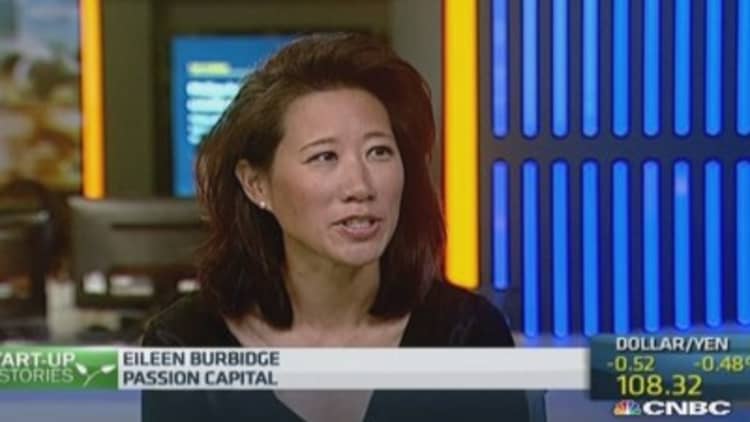For many European entrepreneurs, 'unicorns' are the stuff of dreams. But this particular beast is not the horned horse of legend – but a company with a billion-dollar valuation.
So-called because of their rareness, the U.S. has led the way when it comes to producing tech unicorns. But Europe is closing in, according to experts at TechCrunch Disrupt in London Tuesday.
Global venture capital firm Index Ventures' Saul Klein said the fact that there had been around 10 multi-billion-dollar private equity "exits" in Europe over the last year was a sign "the wave is really starting now".
Read MoreDigital medicine? High-tech health care on the way
"The pipeline of European companies that are capable of exiting for 5 or 10 billion dollars - or more - in the next three-to-five years is really building. We're very bullish on the prospects," he told a panel at the conference.
Here, we take a look at some European companies picked by Europe's venture capital experts to become the region's next billion-dollar companies:
BlaBlaCar
French car share service BlaBlaCar provides a platform for drivers with empty seats to connect with people who need a lift. It's had a big year, raising $100 million in funding, hitting 10 million members and launching in its thirteenth country: Turkey.
The company's founder & CEO Frédéric Mazzella told CNBC that BlaBlaCar isn't a niche service and that's what sets it apart. "That's why it's getting so big: it's just going from point A to point B. It's something we do every day and everyone does it," he said.
Eileen Burbidge, partner at early-stage venture capital firm Passion Capital, highlighted that the company – which was founded in 2006 – has had to wait until the public grew comfortable with the concept.
"Now, people and demand are catching up to the fact that this sharing economy really makes a lot of sense. So they're very well positioned," she told CNBC.
The Hut Group
Describing itself as "one of Europe's fastest growing online lifestyle and health and beauty groups" the company's websites include Zavvi.com, LookFantastic.com and BeautyExpert.co.uk, and earlier this year it agreed a £80 million ($130 million) revolving credit facility with banks to help fund international expansion plans.
Read MoreEU needs risk-takers to compete with US: EU's Kroes
Rob Moffat from Balderton Capital – which is an investor in The Hut Group – said the company was an "obvious" candidate to be Europe's next unicorn.
"They're a very big company already, and probably could be public if they pushed for that," he told CNBC, adding that it was The Hut Group's e-commerce technology that set them apart.
"Lots of people can get quite big in e-commerce, but it's very hard to make real profits - and this company is. That's what sets it apart," he added. In 2013, The Hut Group reported a 34 percent hike in sales to £176.4 million, and adjusted earnings before interest, taxes, depreciation, and amortization up 48 percent at £15 million.

PhotoBox
Another big name on the European tech scene is online photo printing service PhotoBox, which was founded 15 years ago and now has 7 million active customers across 20 countries. It acquired online greetings card company Moonpig.com over three years ago and secured a £50 million revolving credit facility from banks earlier this year to fund more mergers and acquisitions.
CEO Stan Laurent told CNBC that the company's focus was currently on growth, rather than becoming an acquisition target or floating on the stock market.
"The main areas that we're interested in are product innovation around personalization, mobile expansion and geographical expansion," he said, but added that PhotoBox wasn't looking State-side any time soon.
"We've decided not to expand into the U.S. for now. We still have only around 8-9 percent of Europe's total photo-printing market share, so our focus is very much European countries right now," he added.
Burbidge said the Photobox team had built a solid company over the years, and had proved its ability to grow both organically and through successful acquisitions.
Read MoreHow long until Europe builds a Google?
"They've shown that they're willing to work with new teams and build new features. For nearly 15 years they've reacted and responded to what the market wanted," she told CNBC. "And the online personalised-gift market is only going to get bigger. People aren't going to tire of this; they want quicker, faster more novel gift ideas."
TransferWise
It might be newer and smaller than the companies above, but money transfer platform TransferWise has caught the attention of some big-name investors. In June it raised $25 million in funding from Richard Branson and Paypal co-founder Peter Thiel.
Another company Money transfer platform TransferWise has caught the attention of some big-name investors, raising $25 million in funding from Richard Branson and Paypal co-founder Peter Thiel in June.
It was co-founded by Taavet Hinrikus, Skype's first employee, in 2010. He was frustrated by the costs involved in transferring money abroad, and devised a peer-to-peer transfer system using the mid-market exchange rate.
The company has big expansion plans – it currently supports 20 currencies, and is on track to launch another 10 currencies in the fourth quarter of this year.
Passion Capital's Burbidge said Transferwise was "well on its way" to being a major European player on the tech scene.
"It's a relatively new company and has an attitude that is really disruptive, which people love," she added.
- By CNBC's Katrina Bishop


